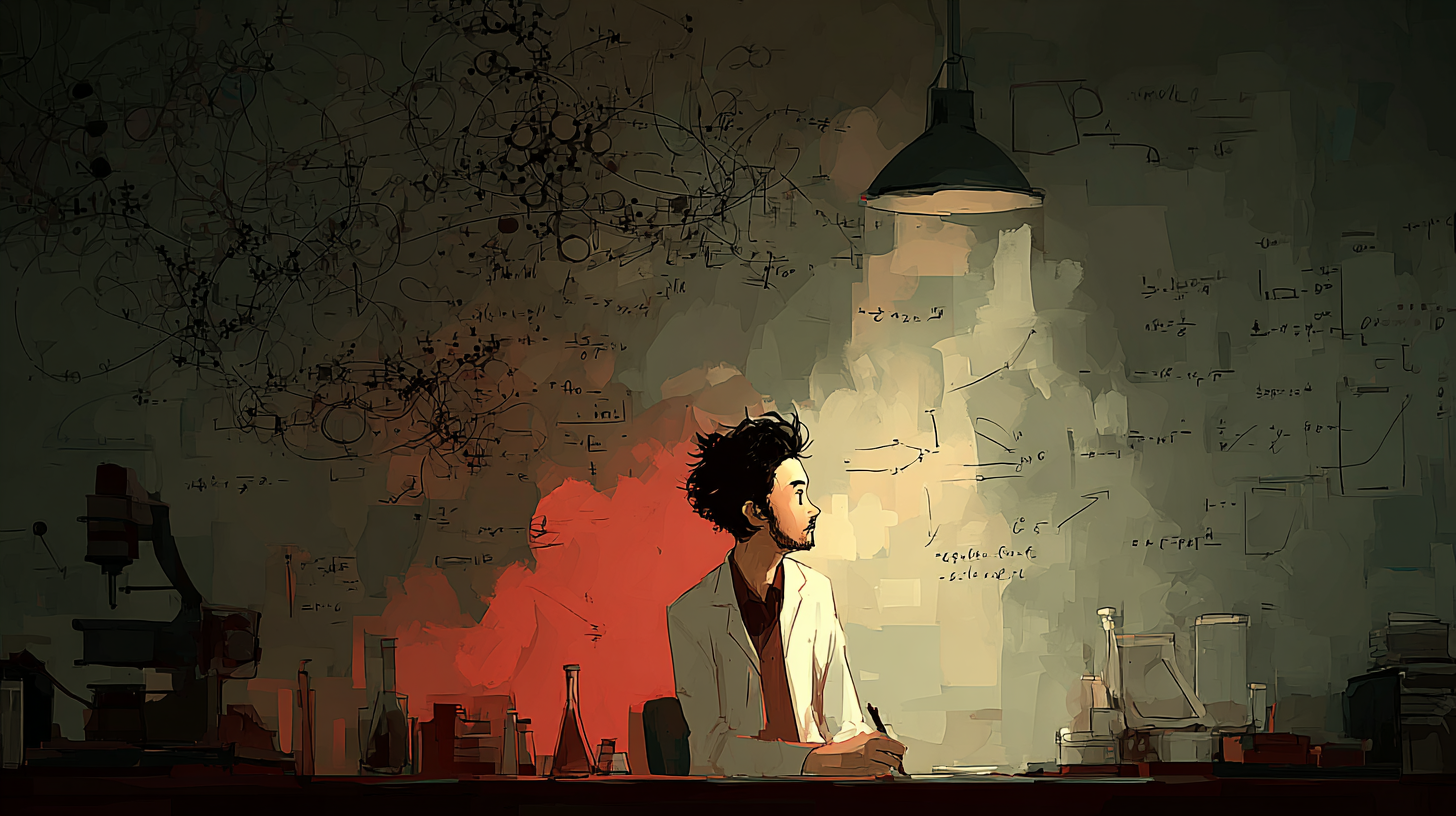A “theory” is an idea or system used to explain how something works.
「theory」は、何かを説明しようとする考え方や仕組みのことです。
以下は英単語 “theory” に関するストーリー型学習コンテンツです。まずは大枠の意味を理解して最後の文章で確認しましょう。
主な意味(main meaning)
| 品詞 | 発音記号 | 意味 | 英語例文 |
|---|---|---|---|
| 名詞 | /ˈθɪəri/ または /ˈθɪəˌri/ | 物事を説明するための考えや仮説、体系的な知識 | The theory of gravity explains why things fall. |
語源(etymology)
ギリシャ語 theoria(観察、思索)から、ラテン語 theoria を経て英語へ。
核となるイメージ: 「観察から導かれた考え・体系」
類義語(synonyms)
| 類義語 | 英語例文 |
|---|---|
| hypothesis | The scientist tested her hypothesis with several experiments. |
| concept | The concept of time is hard to understand for young children. |
| idea | He shared an interesting idea about improving our project. |
| belief | Her belief in hard work helped her succeed. |
| principle | One basic principle of science is to test everything. |
反義語(antonyms)
| 反義語 | 英語例文 |
|---|---|
| fact | It’s a fact that water boils at 100 degrees Celsius. |
| reality | In reality, things don’t always go as planned. |
コロケーション(collocations)
| コロケーション | 英語例文 |
|---|---|
| scientific theory | The scientific theory was supported by many experiments. |
| develop a theory | The team worked hard to develop a new theory. |
| prove a theory | They were able to prove the theory after years of research. |
| theory of evolution | The theory of evolution explains how species change over time. |
| test a theory | We need to test this theory before we accept it. |
2項表現(binomials)
| 2項表現 | 英語例文 |
|---|---|
| trial and error | We used trial and error to develop our theory. |
| cause and effect | The theory was based on the idea of cause and effect. |
| facts and figures | The theory is supported by many facts and figures. |
英語ストーリー(english story)
Title: A New Theory at Work
Tom works in a research lab where scientists try to understand how people use energy in daily life. One day, he developed a theory that people use more energy when they are stressed. He shared his idea with his team, and they were interested.
To test the hypothesis, they observed several workers during their day and recorded data. They used trial and error to improve their method. The concept of stress affecting energy use was new to the team, but Tom believed in it strongly. His belief was that emotions and energy were connected.
After weeks of testing, they found some facts and figures to support the theory. Although it wasn’t yet a scientific theory, it was a good start. The team decided to develop the theory further and planned more tests.
Tom knew that every strong theory needs proof. He worked hard to prove the theory by using more data. He also explained the cause and effect relationships in his report.
In the end, the team was proud. Even if their theory wasn’t perfect, they learned a lot. They realized that reality and theory don’t always match, but both are important in science.
和訳
タイトル:職場での新しい理論
トムは人々が日常生活でどのようにエネルギーを使うかを研究する研究所で働いています。ある日、彼は「人はストレスがあるときにより多くのエネルギーを使う」という**theory(理論)を思いつきました。彼はそのidea(考え)**をチームに共有し、皆も興味を持ちました。
彼らはこの**hypothesis(仮説)を検証するために、何人かの働く人々を観察し、データを記録しました。彼らはtrial and error(試行錯誤)を使って方法を改善しました。この「ストレスがエネルギーの使用に影響する」というconcept(概念)はチームにとって新しかったですが、トムは強くbelief(信念)**を持っていました。
数週間後、彼らは理論を支えるいくつかの**facts and figures(事実と数値)を見つけました。まだそれは正式なscientific theory(科学理論)ではありませんでしたが、良い出発点でした。チームはその理論をさらにdevelop(発展)**させることを決め、もっと多くのテストを計画しました。
トムは、強い理論には証拠が必要だと知っていました。彼はもっと多くのデータを使って理論を**prove(証明)しようと努力しました。また、報告書の中でcause and effect(原因と結果)**の関係も説明しました。
最終的に、チームは誇りに思いました。たとえその理論が完璧ではなくても、多くのことを学びました。彼らは**reality(現実)とtheory(理論)**はいつも一致するわけではないが、どちらも科学には大切だと気づいたのです。
Q&A
- Qtheory と hypothesis の違いは何ですか?
- A
「hypothesis(仮説)」は、実験や調査で検証される前の予想や考えです。「theory(理論)」は、すでに多くの証拠や実験によって支持されている説明体系です。
- Qtheory と concept の違いは何ですか?
- A
「concept(概念)」は、物事の基本的な考え方やイメージです。「theory(理論)」は、その概念をもとにした説明の仕組みや構造です。概念が土台、理論が建物のような関係です。
- Qtheory と idea の違いは何ですか?
- A
「idea(アイデア)」は思いつきや提案などの広い意味の考えです。「theory(理論)」は、一定の根拠や仕組みに基づいて構成された説明のことです。idea は自由な発想、theory は体系的な説明です。
- Qtheory と belief の違いは何ですか?
- A
「belief(信念)」は、証拠がなくても信じることができる個人的な考えです。一方、「theory(理論)」は、証拠に基づいて多くの人に支持される科学的な説明です。
- Qtheory と principle の違いは何ですか?
- A
「principle(原理・原則)」は、基本的な法則やルールです。「theory(理論)」は、そうした原則をもとに構築された全体的な説明体系です。principle はルール、theory はそのルールがどう働くかの説明です。
- Qtheory と fact の違いは何ですか?
- A
「fact(事実)」は、確認された現実の出来事や情報です。「theory(理論)」は、それらの事実をもとに作られた説明の枠組みです。fact は「何が起きたか」、theory は「なぜ起きたか」を説明します。
- Qtheory と reality の違いは何ですか?
- A
「reality(現実)」は実際に存在することや起こっていることです。「theory(理論)」は、その現実をどう理解するかを考える枠組みやモデルです。reality は事実そのもの、theory はその理解の仕方です。
- Qscientific theory とは何ですか?普通の theory と違いますか?
- A
「scientific theory(科学理論)」は、科学的な方法によって立証された理論で、多くのデータや研究によって支持されています。普通の「theory」は日常的な推測にも使われるため、科学的根拠がないこともあります。
- Qtrial and error は theory とどう関係しますか?
- A
「trial and error(試行錯誤)」は、さまざまな方法を試して失敗しながら学んでいく過程です。theory を作るときやテストするときに使われる大切な方法です。theory は結果、trial and error はその過程です。
- Qcause and effect は theory とどう関係しますか?
- A
「cause and effect(原因と結果)」は、ある出来事が他の出来事を引き起こす関係です。多くの theory は、この因果関係を説明するために作られています。theory は cause and effect のパターンを明らかにします。
- Qfacts and figures は theory とどう関係しますか?
- A
「facts and figures(事実と数値)」は、理論を支える証拠となる情報です。theory を信頼できるものにするには、たくさんの facts and figures が必要です。



コメント